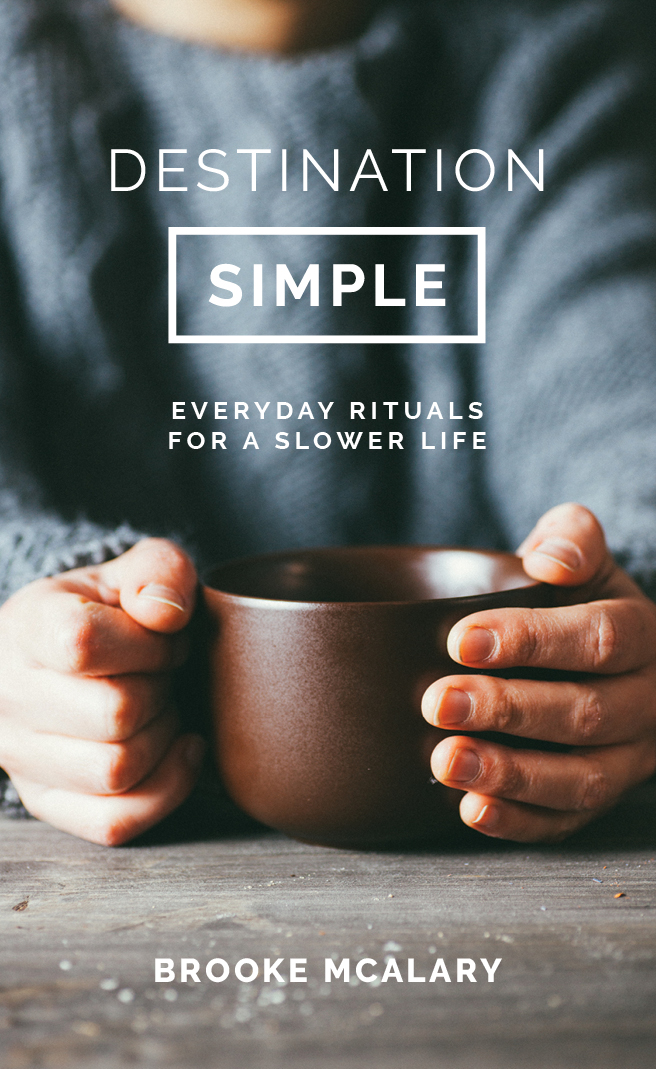We are excited to present this extract from Brooke McAlary’s Destination Simple. This little book will help you make big changes in your busy life, starting with learning to unplug from our online life so we can focus on what’s happening around us.
We need a break.
We need time to ourselves. Time to let the noise, stimulus and information subside. Time when we’re not trying to cram more in.
Our constantly connected world has many advantages. We can communicate across vast distances, experience incredible places virtually, learn from masters and discover anything imaginable with a few clicks of a mouse button or the swipe of a finger. But being constantly connected has disadvantages too. We carry our smartphones in our pockets, using them as cameras, calendars, notebooks and alarm clocks. We feel naked without at least one source of connection – an iPad, smartphone, laptop or all three.
We have forgotten how to simply be. How to immerse ourselves in what is in front of us. How to truly engage in face-to-face conversation, personal connections and true downtime. And we are burning out, completely addicted to this digital connection.
We’re afraid that if we unplug we will miss out on something. We’re afraid that if we aren’t involved in everything, we won’t be seen as important, we’ll be forgotten. But the price we pay for this constant level of connection is steep – unless we learn to offset our digital lives with periods of disconnection.
Steps to Unplugging
- Identify a time. Look at your daily schedule and find a block of 15–30 minutes when you can be off the grid. Choose a time of day when you are unlikely to receive urgent phone calls and when your boss won’t need you.
- Schedule it. Once you’ve nominated a block of time – preferably the same time each day – schedule it in your diary or calendar as your down time.
- Commit to it. Set a reminder alarm on your computer and phone. Set it to sound twice – once five minutes before your unplugging time begins (allowing you to wrap up any tasks before you disconnect) and then again to signal when it’s time to unplug. When you hear that second alarm, close your laptop, take your phone out of your pocket and put it away, switch off the TV and find yourself back in the land of the living.
- Add a pre-bed block. Try adding a second block of unplugged time to your pre-bed routine. There’s increasing research suggesting that evening screen-time or exposure to blue light (from your smartphone, laptop, tablet or TV screen) not only impacts our brain’s ability to recognise that it’s night and therefore time for sleep, but also affects the quality of the sleep we do get.
Removing all technology from the bedroom has been a game-changer in our home, resulting in better quality sleep and calmer, more productive mornings. We don’t wake up to our phones and dive into emails, news and social media first thing anymore. As you read on you’ll see why starting your mornings without technology will help you to establish more positive rituals in your day.
A Note on Reality
I understand how difficult it can be to find uninterrupted time during the day. Whether you work nine to five in an office or you’re home with the kids, life is busy. But unplugging is such an important ritual for simplifying your life; I really encourage you to find the time. If that’s proving hard, try one of these ideas:
- Break your unplugging time into two blocks of 10–15 minutes.
- Try unplugging on the bus or train on your way to and from work.
- Get up earlier and enjoy the early morning quiet without plugging in to your computer or phone – emails can wait 15 minutes.
- Leave for the gym 15 minutes earlier and find a quiet spot to sit.
- Watch one less television show at night.
- Make a real effort to cut back on social media. How many feeds do you really need to scroll through anyway? Try cutting your social media use in half and spend that time offline instead.
What to Do Instead?
You could try:
- sitting quietly
- reading
- walking
- playing with your kids
- writing
- talking with your partner
- prayer
- meditation
- yoga
- sipping a coffee outside, watching the sky, hearing the birds.
Whatever you choose to do while you unplug, the important thing is that you connect with the real world, or allow your mind to access a different virtual one – the world of your own imagination.
Brooke’s book Destination Simple is out now.









